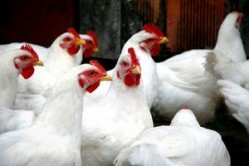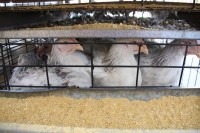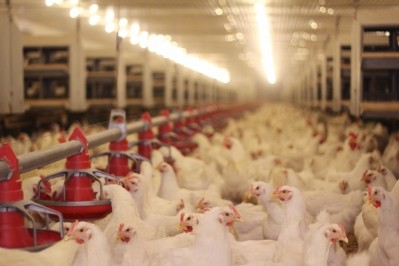Thinking outside the gut – are probiotics the panacea for poultry production pains?

“It is a case of thinking outside the gut. Probiotics can help poultry producers address a raft of husbandry challenges,” Dr Ajay Awati, senior scientist at DuPont Animal Nutrition, told us.
Probiotics work by establishing and maintain a beneficial – as in diverse and stable - microbial population in the gut of the bird. This conditioning makes the gut environment less conducive to colonization by microorganisms that may have a negative impact on animal performance, he said.
Spore forming Bacillus strain probiotics are said to be effective for inclusion in animal feed because of their proven stability in feed production and through the digestive process.
Awati, who presented at Informa’s Animal Nutrition 2014 conference in Brussels last week, said trials conducted in universities or research bodies in Spain, the US and New Zealand indicate how probiotics can also improve the performance of the bird through enabling a better feed conversion ratio (FCR).
“Those trials tested a three-strain Bacillus spp combination, and show improvements in FCR for broilers, of on average 4.4%,” he said.
Egg production and quality benefits
He notes broader benefits from probiotic use in poultry such as enhanced egg quality and higher output levels for laying hens.
“Studies with laying hens have shown improvements in egg production performance and egg quality when fed dried B. spp culture (Xu et al., 2006).
Xu and his team also observed a 2.8% improvement in number of eggs per hen per day, a 1.2% improvement in egg weight, a 2.4% improvement in egg mass per hen per day, and a 5.9% improvement in FCR.
In the same study, egg shell strength was improved by 10.6 %, Haugh unit by 3.1%, and yolk cholesterol was decreased by 12.2%,” he said.
Greening poultry production
Trials show probiotics can also serve to boost the environmental profile of poultry production, said Awati, through the reduction of ammonia concentration in manure.
“Santoso and his team (1999) reported significantly lower ammonia concentration in manure samples when laying hens are fed with dried B. spp culture, besides having significantly improved FCR.
The effect of dried B. spp culture on lowering of ammonia concentration was greater the longer its exposure in the feed,” reported the researcher.
Bird welfare
And probiotics can also help producers address societal concerns and improve the welfare of their birds in that they have been shown to alleviate foot pad dermatitis.
“Probiotics with a three strain mixture of bacillus spp help improve microbial balance and nutrient digestion leading to lower undigested protein and lower ammonia in the manure and litter leading to lower incidence of foot pad lesions,” said Awati.
He said that when choosing a Bacillus supplier, poultry producers need to ensure that they have undertaken extensive research into identifying the most effective isolate strains to achieve maximum growth performance: “There is strong evidence to suggest that multi-strain B. spp are more effective than single strain equivalents.”
AGP alternatives
The idea that probiotics could play a significant role in positively influencing gut health in animal production has risen to prominence as producers seek viable alternatives to antibiotic growth promoters (AGPs) following the bans in Europe and Korea, and planned phase-out in the US.
Unpublished DuPont trial data, said the animal nutrition expert, shows the application of a three strain bacillus produced FCR and body weight gain improvements in broilers during a necrotic enteritis (NE) challenge from hatch to 28 days.
“It is not the case that probiotics can replace antibiotics altogether. But, in tandem with other feed additives such as enzymes, probiotics can support an AGP free broiler feeding program.
Again, studies (Mathis et al, 2013) show probiotics can potentiate the efficacy of enzymes such as a xylanase, amylase and protease (XAP) combination through a synergistic effect to help control the impact of enteric diseases in poultry,” said Awati.
He said 15 years of research at DuPont Animal Nutrition also concurs with such findings.
The company launched a XAP and multi-strain Bacillus combination, Syncra AVI, targeted at the poultry sector, at the IPPE show in Atlanta in January this year.
Trials with the product, said the company, showed a 14% net improvement in relative cost per pound live-weight gain for birds infected with Clostridium perfringens. It was also said to give ROI from improved digestibility and gut health support in healthy birds.
















